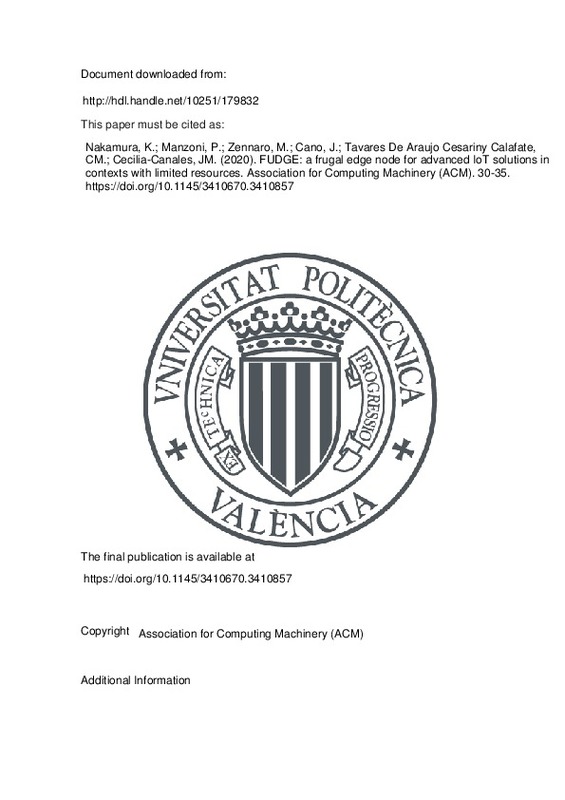Nakamura, K.; Manzoni, P.; Zennaro, M.; Cano, J.; Tavares De Araujo Cesariny Calafate, CM.; Cecilia-Canales, JM. (2020). FUDGE: a frugal edge node for advanced IoT solutions in contexts with limited resources. Association for Computing Machinery (ACM). 30-35. https://doi.org/10.1145/3410670.3410857
Por favor, use este identificador para citar o enlazar este ítem: http://hdl.handle.net/10251/179832
|
Título:
|
FUDGE: a frugal edge node for advanced IoT solutions in contexts with limited resources
|
|
Autor:
|
Nakamura, Kiyoshy

 Manzoni, Pietro
Zennaro, Marco
Manzoni, Pietro
Zennaro, Marco

 Cano, Juan-Carlos
Cano, Juan-Carlos

 Tavares De Araujo Cesariny Calafate, Carlos Miguel
Tavares De Araujo Cesariny Calafate, Carlos Miguel

 Cecilia-Canales, José María
Cecilia-Canales, José María
|
|
Entidad UPV:
|
Universitat Politècnica de València. Departamento de Informática de Sistemas y Computadores - Departament d'Informàtica de Sistemes i Computadors
|
|
Fecha difusión:
|
|
|
Resumen:
|
[EN] The growing connection between the Internet of Things (IoT) andArtificial Intelligence (AI) poses many challenges that require novelapproaches and even a rethinking of the entire communicationand processing architecture ...[+]
[EN] The growing connection between the Internet of Things (IoT) andArtificial Intelligence (AI) poses many challenges that require novelapproaches and even a rethinking of the entire communicationand processing architecture to meet new requirements for latency, reliability, power consumption and resource usage. Edge computingis a promising approach to meet these challenges that can also bebeneficial in delivering advanced AI-based IoT solutions in areaswhere connectivity is scarce and resources are generally limited.In this paper, we introduce an edge/fog generic architecture toallow the adoption of edge solutions in IoT deployments in poorlyconnected and resource limited scenarios. To this end, we integrate,using microservices, an MQTT based system that can collect ingressdata, handle their persistency, and coordinate data integration withthe cloud using a specific service calledaggregator. The edge stations have a dedicated channel with the aggregator based on LoRa to enable long-range transmissions with low power consumption. Some details of the implementation aspects are described along withsome preliminary results. Initial testing of the architecture indicatesthat it is flexible and robust enough to become an alternative forthe deployment of advanced IoT services in resource-constrainedcontexts.
[-]
|
|
Palabras clave:
|
LoRa
,
IoT
,
Edge computing
,
AI
|
|
Derechos de uso:
|
Reserva de todos los derechos
|
|
ISBN:
|
978-1-4503-8078-2
|
|
Fuente:
|
FRUGALTHINGS'20: Proceedings of the 1st Workshop on Experiences with the Design and Implementation of Frugal Smart Objects.
|
|
DOI:
|
10.1145/3410670.3410857
|
|
Editorial:
|
Association for Computing Machinery (ACM)
|
|
Versión del editor:
|
https://doi.org/10.1145/3410670.3410857
|
|
Título del congreso:
|
1st Workshop on Experiences with the Design and Implementation of Frugal Smart Objects (FRUGALTHINGS 2020)
|
|
Lugar del congreso:
|
Online
|
|
Fecha congreso:
|
Septiembre 25-25,2020
|
|
Código del Proyecto:
|
info:eu-repo/grantAgreement/AEI/Plan Estatal de Investigación Científica y Técnica y de Innovación 2017-2020/RTI2018-096384-B-I00/ES/SOLUCIONES PARA UNA GESTION EFICIENTE DEL TRAFICO VEHICULAR BASADAS EN SISTEMAS Y SERVICIOS EN RED/
|
|
Agradecimientos:
|
This work was partially supported by the Ministerio de Ciencia,
Innovación y Universidades, Programa Estatal de Investigación, Desarrollo e Innovación Orientada a los Retos de la Sociedad, Proyectos I+D+I 2018, Spain, under ...[+]
This work was partially supported by the Ministerio de Ciencia,
Innovación y Universidades, Programa Estatal de Investigación, Desarrollo e Innovación Orientada a los Retos de la Sociedad, Proyectos I+D+I 2018, Spain, under Grant RTI2018-096384-B-I00.
[-]
|
|
Tipo:
|
Comunicación en congreso
Capítulo de libro
|







![[Cerrado]](/themes/UPV/images/candado.png)


